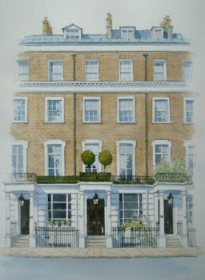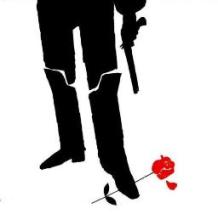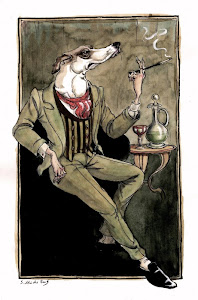
19 February 2009
A Strategy for Living: Pt. I
 (i) Today our people exist in a modern techno-managerial state whose increasingly authoritarian form of rule is directly proportional to societal decline.
(i) Today our people exist in a modern techno-managerial state whose increasingly authoritarian form of rule is directly proportional to societal decline. (ii) To get along, we must be reduced to a lowest common denominator. Any differences or inequalities in thought, culture, achievement, and feeling, must be eliminated. But inequality is the natural condition of mankind; to eradicate inequality we must eradicate mankind.
(iii) I repeat: inequality is the natural condition of mankind. We differ in many things, such as abilities, talents, material success, level of suffering, perception. Each one of us has a place, a part to play. Every one of us has a unique destiny. Yet we are all interdependent. Man is a social being.
(iv) There are those -- perhaps the majority of people--who are happily oblivious to life’s deeper meanings, who are content to amble through life like mere vertebrates. And then there are those people endowed with a penetrating vision that is as cruel as it is clear. These are the poets.
(v) One of the most painful things a man can endure is to be aware of the fundamental absurdity of life. It sets him apart from the masses, for whom physical pleasure is everything.
(vi) Life is absurd and tragic. But in the end we can only set our face to the wind and laugh. That, I think, is the best strategy.

17 February 2009
12 February 2009
06 February 2009
Silhouette Island, Seychelles, August 2008
 During our honeymoon tour of the Indian Ocean and East Africa late last year, my new bride and I travelled in the Seychelles, including a stay on Silhouette Island. My natural excitement at being in the Seychelles with my bride was enhanced by the diverse wildlife to be found in the country.
During our honeymoon tour of the Indian Ocean and East Africa late last year, my new bride and I travelled in the Seychelles, including a stay on Silhouette Island. My natural excitement at being in the Seychelles with my bride was enhanced by the diverse wildlife to be found in the country.Silhouette, as I discovered, is home to the Nature Protection Trust of Seychelles (NPTS). The NPTS was established in 1992 as the first environmental non-governmental organisation registered in Seychelles. NPTS aims to restore and preserve viable ecosystems and takes a long-term view of ecology. Much of its work involves monitoring and scientific research. This research is providing new insights into ecological problems and ecosystem management.
 My bride, knowing my intense interest in zoology, herpetology, and wildlife in general, insisted we visit. However, when we did, we found the NPTS centre closed; I duly left a note with our name and number. That same evening around 9:00PM, as we were headed to the bar, we received a call from the nice English scientist and conservationist who runs the centre. He apologised for having missed us earlier, but had gone to Mahé (the main island) for supplies. He invited us for a tour that night.
My bride, knowing my intense interest in zoology, herpetology, and wildlife in general, insisted we visit. However, when we did, we found the NPTS centre closed; I duly left a note with our name and number. That same evening around 9:00PM, as we were headed to the bar, we received a call from the nice English scientist and conservationist who runs the centre. He apologised for having missed us earlier, but had gone to Mahé (the main island) for supplies. He invited us for a tour that night. The NPTS site on Silhouette features a visitor centre, giant tortoise enclosure, and tortoise breeding compound. In fact it is home to the Seychelles Giant Tortoise Conservation Project, dedicated to the preservation and propagation of the Seychelles giant tortoise. The visitor centre itself contains a thorough exhibit of the local fauna, including a live endangered Seychelles terrapin, incubating giant tortoise eggs, a miniscule tree frog no bigger than the fingernail of your smallest finger, and a ferocious-looking (dead) specimen of the poisonous giant centipede (we had spotted one during our earlier stay on Mahé).
Labels:
Africa,
On Tour,
Seychelles
05 February 2009
Ffizz
 Does anyone, I wonder, remember this most delightful televisual programme from the 1980s? It aired (if that is the right term) in the late 1980s, only for a season or two. I recall watching it not with any special attentiveness, but with a fervent sensation growing in my breast, which, on mature reflection, can only be called envy. Why? It featured two hard-drinking, well-to-do wine merchants, Hugo and Jack, suddenly forced, by an impending recession and their accountant's demise, to brazen out their wine business in grubby shirt sleeves, moist brows, and hours of hard work. It was notable, I think, for the amount of serious wine-drinking it portrayed. Which is why I celebrate it here and raise a glass (or three) to its memory.
Does anyone, I wonder, remember this most delightful televisual programme from the 1980s? It aired (if that is the right term) in the late 1980s, only for a season or two. I recall watching it not with any special attentiveness, but with a fervent sensation growing in my breast, which, on mature reflection, can only be called envy. Why? It featured two hard-drinking, well-to-do wine merchants, Hugo and Jack, suddenly forced, by an impending recession and their accountant's demise, to brazen out their wine business in grubby shirt sleeves, moist brows, and hours of hard work. It was notable, I think, for the amount of serious wine-drinking it portrayed. Which is why I celebrate it here and raise a glass (or three) to its memory.
04 February 2009
Simon Raven Respectfully
 "For any authority, however flexible and however enlightened, must in the last resort of all depend upon respect. In King’s we were all accounted equals but we were equals who respected one another and based our respect in a proper recognition of individual excellence; and so there could be authority between equals. But in the world at large there is no respect. Or rather, there is so much respect, since anything or anybody at all must be accorded it, that the word is made meaningless. The most trivial platitudes, the most misleading and sentimental half-truths, the merest non-sense—all must be received with ‘respect,’ less feelings be hurt and ‘justifiable resentment’ aroused. Is the work shoddy? Are the foundations shallow, the support unseasoned, the bricks carelessly laid? But this, my friend, is the work of free and equal men, and even as the house totters to the ground you must treat the builders with ‘respect.’ Fools, knaves, malingerers; the stupid, the incapable, the idle and the vicious, the spiteful, the envious, the mediocre and the mean—any and all of these you must ‘respect.’ Respect the people, respect their ‘rights,’ respect labour and respect its dignity, respect simplicity, respect ignorance, respect superstitious opinion, public morals, minority prejudice and majority hysteria—all these you must and will respect.
"For any authority, however flexible and however enlightened, must in the last resort of all depend upon respect. In King’s we were all accounted equals but we were equals who respected one another and based our respect in a proper recognition of individual excellence; and so there could be authority between equals. But in the world at large there is no respect. Or rather, there is so much respect, since anything or anybody at all must be accorded it, that the word is made meaningless. The most trivial platitudes, the most misleading and sentimental half-truths, the merest non-sense—all must be received with ‘respect,’ less feelings be hurt and ‘justifiable resentment’ aroused. Is the work shoddy? Are the foundations shallow, the support unseasoned, the bricks carelessly laid? But this, my friend, is the work of free and equal men, and even as the house totters to the ground you must treat the builders with ‘respect.’ Fools, knaves, malingerers; the stupid, the incapable, the idle and the vicious, the spiteful, the envious, the mediocre and the mean—any and all of these you must ‘respect.’ Respect the people, respect their ‘rights,’ respect labour and respect its dignity, respect simplicity, respect ignorance, respect superstitious opinion, public morals, minority prejudice and majority hysteria—all these you must and will respect. But one thing you may not respect. Excellence or merit. Because if you respect this, you stand to allow that someone is better than someone else, and that, by current reckoning, is to destroy respect. Respect has been inverted: it is now what the great or gifted man must pay to his average fellows—in return for which they may possibly suffer him to serve them. Their respect is reserved for a different purpose—to console and flatter themselves. There can be none to spare for the authority of learning or of practiced tolerance or even of plain fact: still less to spare for that honourable figure of a vanished age—the English Gentleman."
But one thing you may not respect. Excellence or merit. Because if you respect this, you stand to allow that someone is better than someone else, and that, by current reckoning, is to destroy respect. Respect has been inverted: it is now what the great or gifted man must pay to his average fellows—in return for which they may possibly suffer him to serve them. Their respect is reserved for a different purpose—to console and flatter themselves. There can be none to spare for the authority of learning or of practiced tolerance or even of plain fact: still less to spare for that honourable figure of a vanished age—the English Gentleman."Simon Raven, The English Gentleman (1961)
Labels:
Simon Raven
02 February 2009
Subscribe to:
Comments (Atom)


























